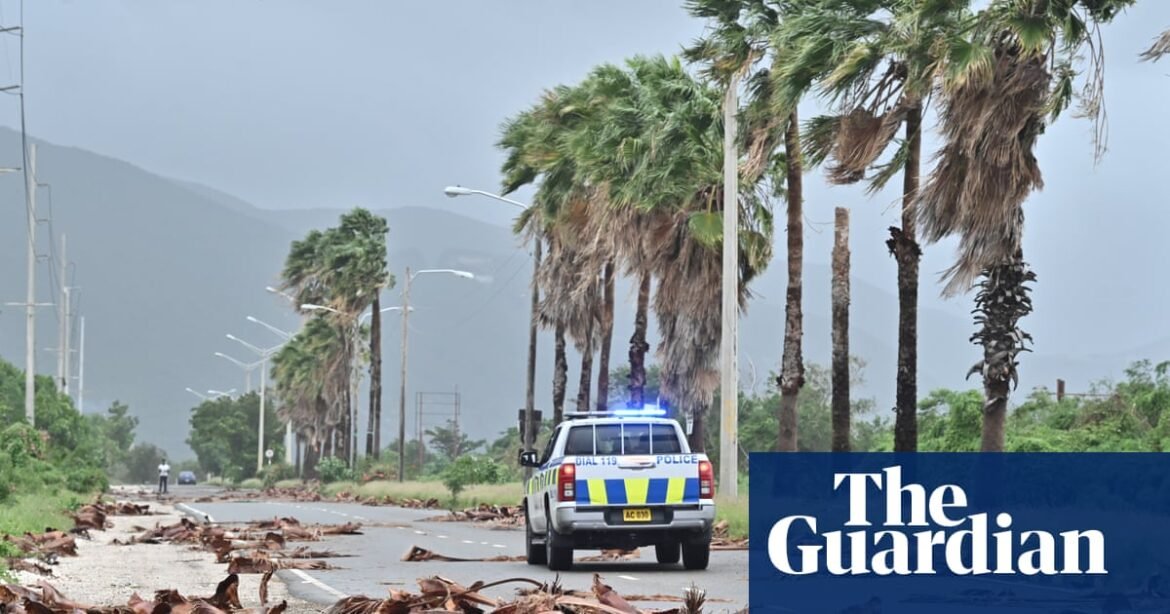Good morning.
Hurricane Melissa is heading towards Cuba after the “storm of the century” made landfall as a category 5 storm in Jamaica, battering the country with severe winds, flooding and landslides.
The National Hurricane Center (NHC) said Melissa, which it described as an “extremely dangerous hurricane”, had weakened to a category 3 storm before it made landfall in Santiago de Cuba province, on the island’s southern coast.
Jamaica’s minister of local government, Desmond McKenzie, said more than 530,000 people were without electricity and close to 15,000 were in storm shelters. He said that the south-western parish of St Elizabeth was “under water” and that at least three families were trapped in their homes in Black River, in western Jamaica, with emergency services struggling to reach them.
-
Is this the worst hurricane ever to hit Jamaica? It is the most intense one since records began in 1851.
-
Have casualties been recorded? When asked, McKenzie declined to confirm whether there were any deaths.
-
Follow our liveblog to stay up to date.
Israeli strikes in Gaza kill at least 104 overnight as ceasefire looks fragile
Israeli airstrikes on Gaza overnight killed at least 104 Palestinians, including children, in what appeared to be the gravest challenge yet to the increasingly fragile US-brokered ceasefire and the deadliest day since the truce began.
The strikes, one of the bloodiest attacks in the two-year war, killed at least 35 children and injured 200 people, Gaza’s civil defence agency said. They took place hours after Donald Trump said nothing would jeopardize the ceasefire agreement he had helped broker.
Dr Mohammed al-Mughir, the director of humanitarian support and international cooperation at the civil defence in Gaza, told the Guardian: “Among these attacks was the targeting of a cancer patient camp, the Insan camp.”
-
What happened before the strikes? The Israeli prime minister, Benjamin Netanyahu, ordered the strikes on Tuesday evening after a firefight between Palestinian militants and Israeli troops. The strikes also followed anger over Hamas handing over body parts of a hostage whose remains Israeli troops had recovered two years before.
Trump and Xi talks could end months of global economic chaos
Donald Trump and Xi Jinping will meet on Thursday for the first time since the US president’s return to the White House, as officials seek to map out what a trade deal between Washington and Beijing might include.
The pair will meet on Thursday at the sidelines of the Asia Pacific Economic Cooperation summit in Seoul, six years on from their last meeting. A key topic on the agenda will be rare earths – China controls 70% of the world’s rare earths mining, which is vital for US industry.
In preliminary talks held in Kuala Lumpur over the weekend, Beijing appeared to agree to defer for a year the export controls on rare earths it introduced this month, likely in exchange for Washington freezing its recent ban on the export of advanced semiconductor technology to China.
-
What about Taiwan? The US president indicated the sensitive topic may not be discussed, saying: “I don’t know that we’ll even speak about Taiwan. I’m not sure. He may want to ask about it. There’s not that much to ask about. Taiwan is Taiwan.”
In other news …
Stat of the day: The wealthiest 0.1% of Americans burn carbon at 4,000 times the rate of the world’s poorest 10%
The richest 0.1% of Americans are creating carbon emissions at 4,000 times the rate of the world’s poorest 10%, according to an analysis provided to the Guardian. The data, produced by Oxfam and the Stockholm Environment Institute ahead of Cop30, draws attention to the growing carbon divide, with those least responsible for ballooning emissions suffering the harshest consequences.
Don’t miss this: War photographer Don McCullin on 19 of his greatest pictures
The war photographer Don McCullin has spent seven decades recording tragedy, from Cyprus to Vietnam. Now 90, he recounts his life through 19 of his best photographs, speaking about escaping the poverty he was born into and feeling “uncomfortable” for being rewarded for capturing people’s deaths. “You’re stealing other people’s emotional tragedies … I feel as if I have to release myself from my guilt, which I still carry.”
Climate check: Rising heat kills ‘one person a minute worldwide’
Global heating is killing one person every minute, a major report has revealed. The comprehensive report says the failure to tackle the world’s reliance on fossil fuels, which is also causing toxic air pollution, wildfires and the spread of disease, will worsen global health as leaders, including Donald Trump, ditch climate policies. After accounting for population rises, the rate of heat-related deaths has increased by 23% since the 1990s, the report found.
Last Thing: The radical experiment that brought a forest into a preschool
Where many preschools dissuade children from getting dirty, Humpula daycare center encourages youngsters to cover themselves with mud, soil and leaves while playing. The center, in Lahti, north of Helsinki, is one of 43 awarded funding to rewild yards and to increase children’s exposure to nature’s microscopic biodiversity, as scientists seek to learn more about the importance of biodiversity on children’s health.
Sign up
Sign up for the US morning briefing
First Thing is delivered to thousands of inboxes every weekday. If you’re not already signed up, subscribe now.
Get in touch
If you have any questions or comments about any of our newsletters please email newsletters@theguardian.com

